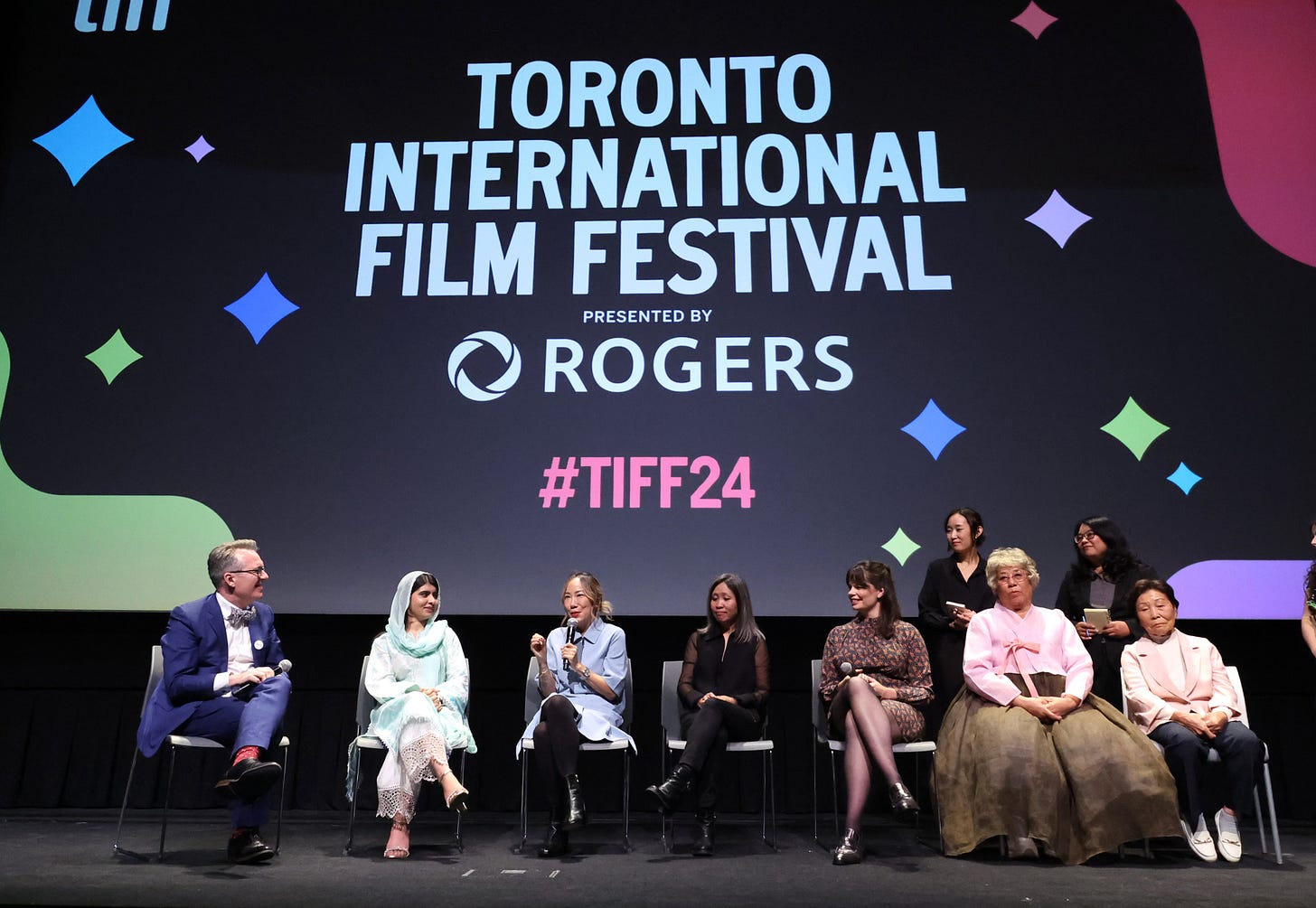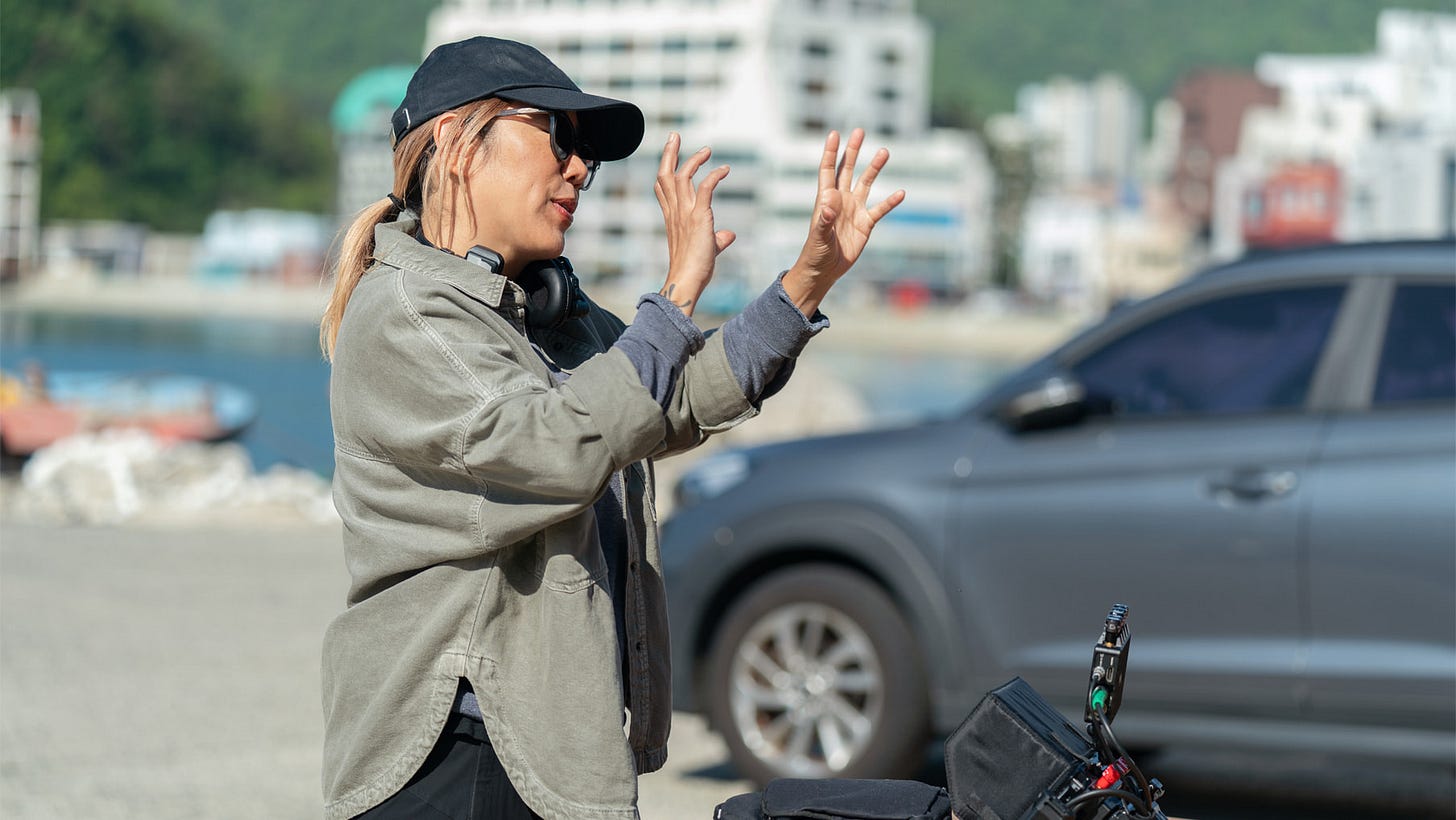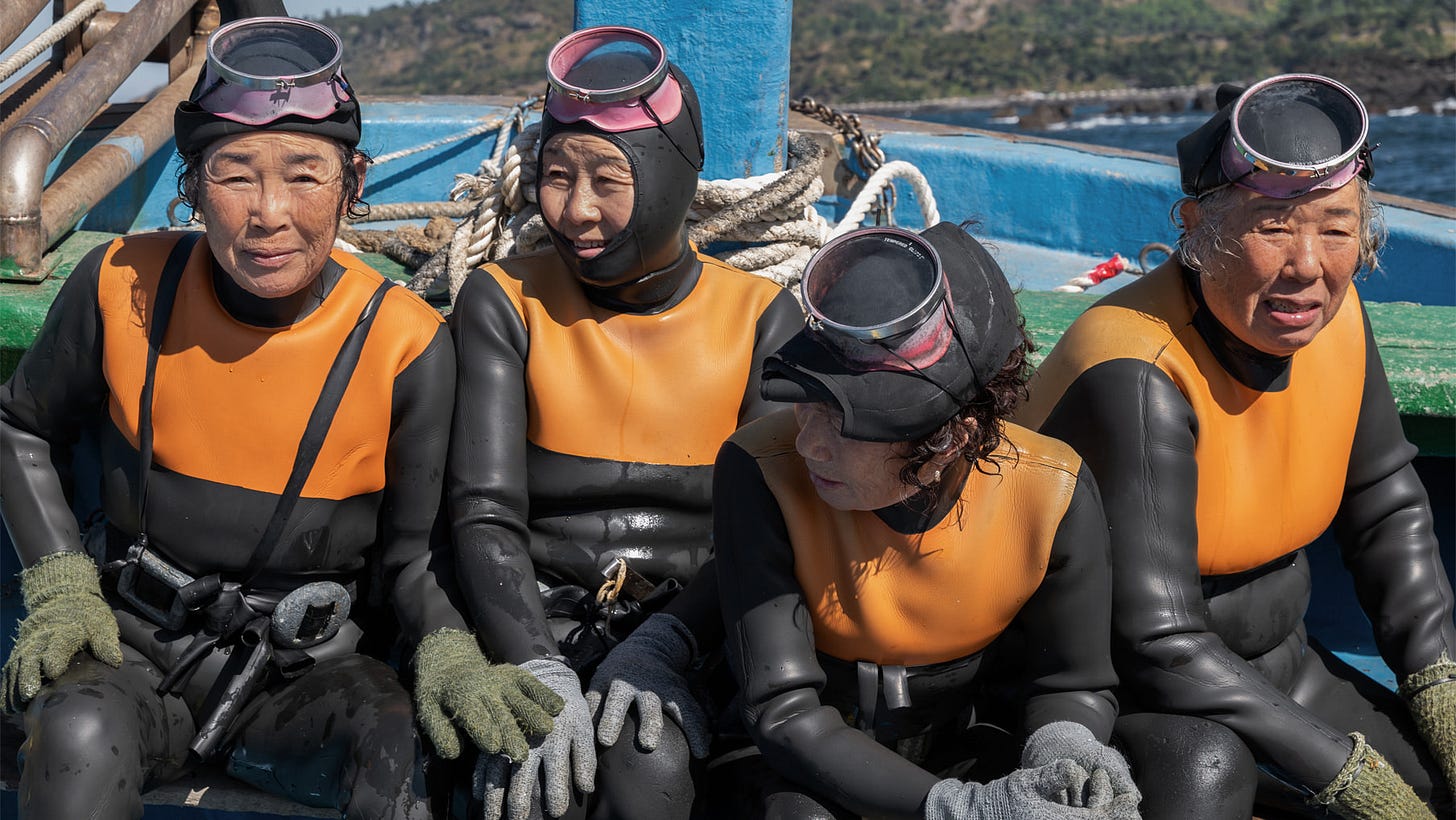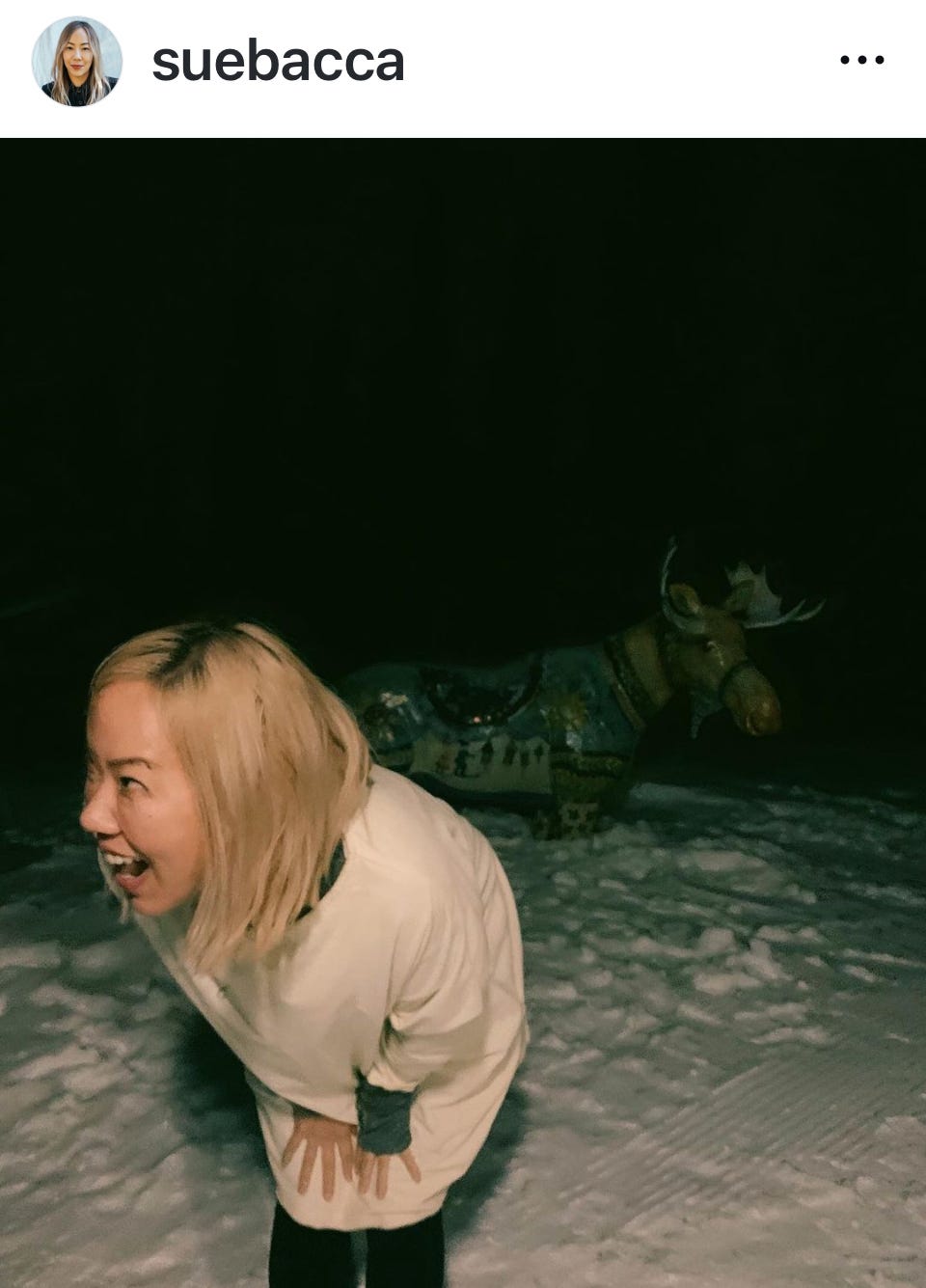Asian A.V. Club newsletter #32: Sue Kim
Director Sue Kim talks to us about following her creative voice and how that led to making this season's breakout documentary The Last of the Sea Women.
Director Sue Kim has always been fascinated by the haenyeo women of South Korea’s Jeju Island. As a young child, she’s always admired these female divers, who have spent centuries harvesting seafood from the ocean floor. Over time, she noticed these women were dwindling in numbers as younger generations shifted to other industries. Plus climate change and environmental contamination have also impacted the productivity of their daily catch.
Driven by a sense of urgency to preserve their stories, Kim spent two years capturing this potentially last generation of haenyeo, showcasing their sisterhood and tight-knit community.
With producer and Nobel Peace Prize laureate Malala Yousafzai, The Last of the Sea Women world premiered at the 2024 Toronto International Film Festival, introducing these tough, and sometimes rowdy, women to the world. We caught up with director Kim to talk about the experience of bringing two fan-favorite haenyeo’s to the premiere, and also how her personal creative journey led to this moment as a filmmaker. Trust me, her story is as inspiring as the film itself!
Translator, Haenyeo Lee Hee Soon & Jang Soon Duk, Dir: Sue Kim
Asian A.V. Club: I recently went to a special screening of your film. Although I wanted to learn more about the whole experience of making your documentary, I really appreciated the way you watched over the two haenyeo (Jang Soon Duk, Lee Hee Soon) who were your special guests. Can you describe what it’s been like to see them experience audiences embracing their story on international stages like the Toronto Film Festival and in New York? It must be such a beautiful and emotional and even protective experience for you.
Sue Kim: You are so perceptive. My main takeaway from this whole experience has been, from a distance, watching the haenyeo’s that we brought over experience this kind of whirlwind celebration of them and their culture. I think that was the part of the whole experience that was the most rewarding and fulfilling, but also just fun too. Because basically, as you see in the film, the haenyeo’s are the most amazing women, and they're so funny and feisty, and say crazy, out-there stuff.
And so half the time when I was watching them during the Q and A's, I would be so moved at something that they said that was so deep and wise and profound. And then the other half of the time I would be like, trying to hold in my laughter when they're saying something about the details of the diving. I don't know if you remember at your screening, [Jang Sook Duk] was mentioning about how they have to really hold their breath down there, and sometimes they have to pee in their wetsuit. (laughs) You just never know what they’re going to say.
Asian A.V. Club: I heard the world premiere at Toronto was really emotional.
Sue Kim: Oh definitely. When we all walked on-stage afterwards for the Q and A, Jang Sook Duk, our sort of main haenyeo character, she really kind of broke down and just started really sobbing. Of course, it got all of us sobbing. Because the minute she walked out, the entire audience stood up and gave her a standing ovation. And I think she had never, especially when we were filming with her, anticipated that she would get flown halfway across the world, to show western audiences a film about her and her community. And to see how these audiences reacted in such a positive way, was really overwhelming for her. So, when she started crying, every single person on the stage cried too, because we were witnessing her experience. That's been the best part of all the screenings, just seeing audiences understand and admire them and want to cheer and root for them. That’s been very meaningful.
Asian A.V. Club: This is going to sound a bit ‘woo woo’, but you came across the haenyeo’s quite serendipitously and then created this love letter to a generation of women who might be on the tail end of their calling. It almost feels like you’re a vessel invited to not only document these women, but to celebrate them on film, almost like a time capsule for future generations.
Sue Kim: You're so astute, because I actually have used the word ‘vessel’ many times to describe what role I view myself as a filmmaker. I have been a recipient of some very fortunate accidents, like my first film The Speed Cubers basically should never have happened. The way that I was able to talk to Netflix and get them involved, could never happen in a normal universe. And the same thing happened on this film, where doors just opened. And I am a very ‘woo woo’ kind of spiritual person. (laughs) I always kind of think when that happens, something greater than you is doing its work. In both films, I felt a responsibility as someone who had a personal connection to the subject matter.
With the haenyeo’s, I saw them when I was eight years old. And I basically grew up, adoring and loving them. I thought that they were the feisty aunts that I always wanted, super cool and badass. I wasn’t a very ladylike girl. I was a tomboy, so I really kind of latched on to them. I started going back to Jeju (Island) in my adult years to find and talk to them. And so, I felt a little bit of a responsibility to make this film, before we no longer have them, and knock on wood, hopefully that won't happen. Maybe something with this film will help change that. But it absolutely felt like a moral obligation, but also a true pleasure and the passion project of my life.
Asian A.V. Club: What does it feel like to be able to put this story out after living with the haenyeo’s for so long?
Sue Kim: In the same way a vessel is used, once it's done, you kind of back off, and it's out there. I helped. I was a useful tool to help get the film made, I helped get the story, I helped to get publicity. And then once I've done my job, it's like a bird and has to live its own life. And so that's kind of my feeling about it. I'm so blessed that I have had this lifeline experience with the haenyeo, and that I was able to help make sure that their story was told while we still have them. But now that the film is done and released, I'm fully letting go of it. I think it'll have a great life, and hopefully it'll reach lots of people around the world who will grow to know and admire and love, the haenyeo the same way I do. I have no control of it. I was a tool for the message being made, and now that it's out there, it's hopefully going to live its best life.
Asian A.V. Club: I hope you don’t mind me going backwards a bit, but I kind of looked at your career and it’s fascinating to see you worked at creative agencies, then went in-house for brands like Nike and Adidas and at one point even had a record label, this is definitely not the traditional career route. What is it like to kind of follow the things that felt right for your career? Did you have parents that were just like, ‘you go, girl?’ (laughs) I’ve heard this Asian myth exists for some!
Sue Kim: (laughs) I am totally that parent to my kid. From our generation, I don't know if we have parents like that. I grew up the child of Korean immigrants, and they had a very, sort of, immigrant mentality of like, we came to this country for a new beginning and the American dream. We want you to study hard, become very successful. We want all the good things in life for you.
So, my parents were just very stereotypically, very academically oriented. And I was actually a good student, got good grades, and got into a good college and all that stuff. But I was always creative, and that's the part that was hard. My whole life, it's been this tension of wanting to be an artist in all sorts of ways, and then later in my years, I actually tried different venues, but had this parental pressure to be a doctor or a lawyer.
Asian A.V. Club: So, what did you do to satisfy your creative side?
Sue Kim: What happened was, I went to Georgetown for college, and I was in their School of Foreign Service because my parents were very adamant that I should be an international lawyer. I hated it so much. I was taking macroeconomics of Latin America and just all these classes that I had no interest in. And at that moment in my life, I was really into creative writing, so I changed my major to English Lit and Creative Writing within that college, and my parents found out… and don't be shocked… they disowned me.
They literally disowned me for changing my major to a creative one. But you know what? Honestly, that was one of the best early adult lessons I could have ever had, because it was a real crisis at bay for me, and I had to decide at that moment if I’m going to live the life that my parents want for me, or am I going to be a little bit more brave, even if it's a lot less secure and a lot more scary? Can I go down the path of pursuing life as a creative person, because I knew deep down, that’s who I am.
So, I basically moved out of their house, and moved in with a cousin in Chicago, waited tables, and then I transferred to Berkeley, and I majored in English Lit and creative writing. And then that's basically what happened.
Asian A.V. Club: Did it take a while for them to understand you?
Sue Kim: I later reconciled with my mom. And it’s been fine. My dad, unfortunately, kind of never got over the disappointment. But it started me down a path of becoming very self-sufficient and independent in a way that felt very purposeful. Because if I'm gonna cause this deep split in my relationship with my parents, it better be worth it, and I better put everything I have into it.
Asian A.V. Club: How did you get on the ad agency track?
Sue Kim: I graduated from Berkeley, and then I immediately started working in the music industry and started a record label [Badman Recording Co.]. Then I went back to school for graphic design and was a graphic designer for a bit. Basically, long story short, I got carpal tunnel when was working for an ad agency, and since I couldn't design anymore, they invited me to become a producer in their broadcast department. So, I started producing TV commercials, and that's how I really got into film. I basically spent 20 years on set making commercials for Nike and Adidas, working with some of the best directors in the world. It was basically like film school because I was shadowing Spike Jones and Alejandro González Iñárritu, finding out how they work and learning all the secrets.
And then I took another big risk about six years ago, and I quit my very lucrative, stable job in the advertising world to make my first documentary, which was a short film [The Speed Cubers] about people who compete in Rubik's Cube solving. Unsurprisingly, it did not seem to be like a good life decision to a lot of people around me. (laughs) They were probably wondering what I was doing, but again, it turned out to be the best thing ever, because it led to this other career that I have now. The Last of the Sea Women wouldn't exist if I hadn't taken that leap of faith six years ago.
Asian A.V. Club: Somewhere in-between shooting The Last of the Sea Women, you also executive produced the K-pop doc series K-pop Idols!
Sue Kim: I was approached by the production company to help out, and I took on the project mostly because it would put me in Korea where I love to be, and it helped me get situated to work on the Sea Women film.
Asian A.V. Club: As an industry that’s notoriously private, was it hard to get the K-pop talent to open up?
Sue Kim: It wasn’t difficult to get artists to be honest and transparent about what they were going through, I felt they actually really appreciated the opportunity to talk about their dreams and their struggles. But working with the labels was difficult because they tended to be quite controlling about the images of their artists. And for good reason, I don’t blame them, K-pop fans can be both wonderfully supportive and unfairly judgmental. So, the labels were always worried about how fans might perceive the things their idols might say or do. But it was a fascinating industry to get a glimpse into.
Asian A.V. Club: You’ve pursued this amazing, varied career betting on yourself, do you think there are other lanes you want to try out next? Perhaps narrative storytelling?
Sue Kim: As someone who has changed my career significantly a few times already, I am happy to report, I feel like I'm finally in the career that I was always meant to be in. (laughs) This this is the first time I've ever felt that the skills required to be a documentary director are coming out of me intuitively. It is a natural process for me and also brings me so much happiness and fulfillment and satisfaction to be telling stories, especially the kind of stories I like to tell. To be able to spotlight stories of unsung communities that in some way exhibit some sort of valor, integrity, decency, or something good for the universe to know.
I don't think that there’s another term down a fork in the road for me. I feel like finally I found what I want to do. Maybe someday, I could think about doing scripted, but to be perfectly honest, it doesn't entice me the same way as talking and profiling real people. I think I finally, in my middle age, found the thing that I was meant to do.
Asian A.V. Club: We really admire the work you’re doing and thank you for talking to us.
Sue Kim: It was really nice talking to you too. Thank you.

















Such a moving interview! I really need to see this.
Ahhh such an inspiring career path!! Can’t wait to watch the doc 💯